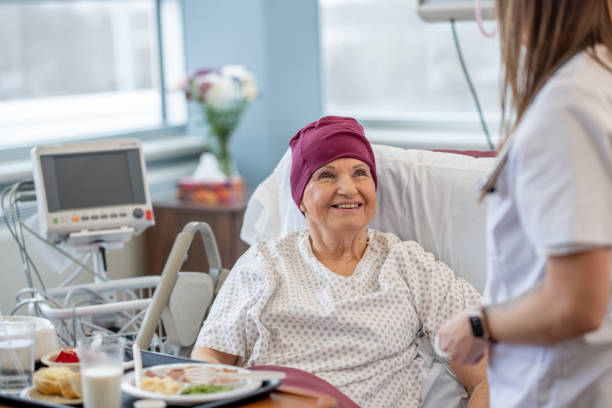Nobody wants to think of dementia as a part of life, and yet it’s an illness that affects more people than we like to think. Elderly folks especially suffer from dementia-related ailments, and for many of them, home care is the best way to maximize their quality of life and retain some semblance of independence and dignity despite this profound struggle. However, the daily challenges and unpredictable nature of the illness make it a complex endeavor to take on the task of providing top-level home care for someone with dementia.
In this blog post, we’re going to dive into the ins and outs of how best to maximize quality of life for dementia patients with home care. We’re going to look at the kind of care needed, how to manage challenging behaviors, and the small steps that caregivers can take to improve their patient’s quality of life. Our goal is to explore what makes for successful home care for dementia patients, as well as take a look at some simple yet effective actionable strategies we can all use to give those with dementia the best possible quality of life — whether that is through loving support, unchanging routines, or other creative solutions.
Quality of Life for Dementia Patients with Home Care
Maximizing quality of life for dementia patients through home care is critically important, as it allows elderly people to remain comfortable and secure while receiving proper care. Home care for dementia patients can be organized into two different tiers: medical and non-medical services.
- Medical services typically involve skilled nursing care that involves performing procedures such as blood draws and urine tests, administering medication, providing wound care, providing respiratory therapy, and performing other nursing-related tasks. This style of home care requires the patient to have a higher level of functioning and be able to comply with the needs of a professional nurse in the home.
- Non-medical home care does not require a patient to be at a certain healthcare level; rather, it is more custodial in nature. This tier includes assistance with household chores, laundry, medication reminders, meal preparation and shopping, errands and transportation needs, and bathing and dressing, all of which are designed to aid the caregiver in taking responsibility for their family member’s day-to-day activities. It also provides caregivers with peace of mind that someone is checking on their elderly loved one throughout the day.
While having both medical and non-medical services available in the home can provide companionship, security, and assistance with daily life activities while minimizing hospital stays and visits to long-term care facilities, there are some drawbacks to this type of care. Costs can often be prohibitive, as the fees associated with home health aides or visiting nurses may not fit within most budgets. Additionally, physical space can be an issue, as changes to accommodate wheelchairs or lift chairs may need to occur if no family member is willing or able to physically transfer someone in and out of bed or chairs safely given their strength limitations. And finally, since home care services are usually provided one-on-one, there’s always the risk that they won’t know when a patient’s condition has changed or when something isn’t right medically unless they recognize an obvious issue themselves or are tipped off by either family or neighbors who stop by to visit from time to time.
Given these nuances, it is absolutely essential that anyone who chooses this option for eldercare take the time upfront to evaluate what type of support is best suited for their family member’s individual needs prior to any type of service. Proper planning will go a long way towards ensuring quality of life for someone suffering from dementia through home-based care solutions.
In summary, maximizing quality of life for dementia patients through home care can provide not only peace of mind for caregivers but also a layer of security for the person requiring additional assistance with basic activities like eating and dressing, etc., thereby helping them maintain their independence while addressing any medical concerns without having to leave their familiar surroundings.
Importance of home care
The importance of home care for dementia patients is difficult to overstate. As it enables seniors with cognitive impairments to enjoy the conveniences of home while being around familiar faces, this type of care frequently offers a more affordable and effective solution for providing support. Home care also encourages family involvement, which can reduce feelings of isolation and loneliness in individuals suffering from dementia.
On the one hand, there are advantages to providing dementia patients with at-home care that go beyond cost considerations. Patients often express feelings of joy and comfort when receiving services in the comfort of their own homes. Furthermore, at-home care reduces feelings of isolation and loneliness since they are receiving help from someone already familiar with their daily routine. Caregivers may also be able to provide transportation and access to social activities, allowing seniors with dementia to maximize their quality of life.
On the other hand, there are limitations to at-home care that require consideration before making this type of decision. Isolation is a major risk for seniors living at home; without regular social interaction, they may become lonely or isolated. Additionally, mobility issues due to physical limitations often make moving around the house—even within their own bedroom—easier for those with advanced stages of dementia. It’s essential to consider if multiple caregivers will be needed throughout the day in order to properly oversee all possible needs.
All things considered, providing caregivers with access to specialized training in adapting programs specifically designed for dementia patients can ensure that they are equipped to handle whatever demands may arise when caring for them in their own homes. With these important factors in mind, it’s essential to weigh both the advantages and disadvantages when deciding whether or not an at-home care solution is right for a particular patient’s needs.
Home Care Techniques for Dementia Patients
Home care techniques for dementia patients involve providing a safe, comfortable living space and encouraging meaningful activities as part of a person’s daily regimen. Caregivers can modify a person’s home environment to reduce confusion and maximize safety, such as by removing any hazardous materials to prevent falls, rearranging furniture in familiar patterns, and organizing spaces into specific activity or leisure areas. Keeping Alzheimer’s disease medications, medical equipment, and other necessities within easy reach is important so that daily living tasks are simple to complete.
When providing dementia home care, caregivers must also establish the following:
- Routines for sleep, eating, and bathing to help alleviate confusion and maintain balance.
- Scheduling mental exercises, such as reading books, playing board games, or doing crossword puzzles together, can exercise cognitive functions, help with memory recall, and enhance social interaction. It may be helpful to provide physical activity options that correspond with a patient’s current abilities, from walking around the block to taking part in light stretching exercises or swimming. Taking part in enjoyable activities that remind the dementia patient of hobbies they enjoyed before their diagnosis is key to improving their quality of life.
The debate surrounding appropriate home care techniques for dementia patients generally revolves around balancing structure and freedom of choice. On one side of the argument are those who feel it is essential for caregivers to help create and follow a daily routine for patients with dementia to maximize safety while creating structure in their lives that can ease anxiety. Others view providing freedom of choice as important in order for patients to have autonomy over their decisions, regardless of their illness. This debate helps frame the importance of understanding each individual’s needs when creating personalized plans for home care.
Regardless of which approach is taken by caregivers, perhaps the most impactful technique is offering emotional support through compassionate listening and gentle reassurance, which create positive connections between caregiver and patient. These connections can then be used to bridge communication gaps between patients and family members, which enables increased quality of life in all directions.
Emotional Support
As is the case with many seniors, people living with dementia need emotional support to cope with the changes in their lives. The right kind of emotional support helps to reduce anxiety and depression and gives them a sense of purpose, self-worth, and overall well-being. Caregivers can provide this support by treating their clients with respect, dignifying them, and speaking positively to them throughout the day. It is also important for caregivers to give dementia patients opportunities for social interaction; engaging in activities like talking about memories, music appreciation, or attending group activities can be very beneficial.
At the same time, some argue that emotional support may not be sufficient for dementia patients who are resistant to change due to their condition. These individuals may require more intensive forms of therapeutic intervention, like counseling or cognitive behavioral therapy, in order to cope better with their symptoms and better manage their emotions. It is important that caregivers consult a dementia specialist on how best to provide emotional support for their clients, depending on their individual needs.
Safety Considerations
When providing home care to a patient with dementia, safety is paramount. There are potential risks around the home that can be difficult for caregivers to anticipate and mitigate. For example, older homes may present tripping hazards like loose rugs or uneven steps, while furniture and other items can make pathways difficult to navigate. Installing supportive railings and grab bars in bathrooms can help prevent falls. Additionally, it’s important for caregivers to ensure that stove burners are turned off, cords are secured safely, electrical outlets are childproof, and potential choking dangers such as toys or coins are kept out of reach.
For patients who wander outdoors, there is also an increased risk of injury from falls and trips due to disorientation, as well as the possibility of abduction or becoming lost. To help ease these concerns, caregivers should install GPS technology on their phones or other devices in order to remain aware of their whereabouts at all times. While GPS technology may provide caretakers with peace of mind knowing the patient is safe, it is important to weigh the need for safety with respect for the personal rights and freedoms of dementia patients.
Caregivers should also consider medication management when providing home care for dementia patients, particularly those living alone, as this can be a crucial factor in their overall wellbeing. For many patients with dementia, medication management involves assisting them with managing their own medications and helping them become aware of how each one works and why they need to comply with the instructions regarding taking them properly.
Comfort and familiar environment
When considering quality of life for dementia patients living in home care environments, comfort and familiarity are essential elements to consider — both in terms of creating a safe and pleasant environment as well as providing for the more humanistic needs of those living with dementia. Comfort encompasses both physical elements, such as temperature and other environmental conditions, as well as emotional elements, such as safety and security. Familiarity is important to those living with dementia because it helps lessen feelings of anxiety when routines are disrupted.
Creating a familiar yet comforting environment can be achieved through a variety of methods, from providing calming images on walls to trying to keep furniture layouts consistent. Ensuring that the home care setting upholds proper environmental standards, such as temperature control, minimizes the discomforts associated with physical changes in the home. Such adjustments also improve mood and can reduce agitation due to unfamiliar surroundings. Additionally, keeping familiar objects around can also encourage behavior patterns that are suitable for managing dementia symptoms. Reminiscing about activities or objects that help trigger memories of people or places that bring joy may help further offset any feelings of displacement or distress due to change in the home environment.
However, some caregivers may argue that too much familiarity makes it difficult for those living with dementia to adjust to new situations when necessary — for example, if they need to transition into residential care later on. Yet studies have demonstrated that familiarity is key; having comfortable and familiar objects present in environments keeps individuals active and engaged in meaningful tasks and conversations that contribute positively towards sustaining their quality of life.
By offering a comfortable yet familiar home care environment through the combination of physical and emotional elements, those living with dementia are better able to feel secure enough to engage in meaningful activities found both inside and outside the home.
Engaging Dementia Patients with Home Care
Engaging dementia patients with home care can be an effective way to maximize quality of life. By providing personalized, one-on-one home care and consideration for their individual needs and abilities, elderly individuals living with dementia can have an improved quality of life and experience a sense of validation in their remaining years.
On the other hand, home care for dementia patients can bring challenges about safety and potential risks posed when an individual has cognitive issues or struggles to anticipate dangers. Home care providers must be aware of these concerns and take extra precautions to ensure a safe environment for their clients’ wellbeing.
It is also important to remember that when it comes to engaging dementia patients, care providers must think beyond physical limitations and rather concentrate on cultivating meaningful activities. Outside of medical requirements such as medications, feeding assistance, or bowel movements, family caregivers should provide enjoyable activities that promote independence and engagement. Such activities could range from simple tasks related to daily living skills, such as dressing oneself or cooking meals, to stimulating activities involving music, art, movement, conversations, light housework, and yard work. Additionally, reminiscing about past experiences is an excellent way to bring joy and enhance communication between home care providers and elderly individuals living with dementia.
Finally, connecting socially is equally important for promoting a healthy lifestyle among dementia patients receiving home care. It is critical that these elderly individuals do not feel isolated from friends or families when receiving care at home. Therefore, taking steps to include social gatherings in addition to music therapy or recreational mental games is key to creating positive interactions for elderly individuals afflicted by dementia to enjoy in the comfort of their own homes.
Activities and Exercise for Dementia Patients
Activities and exercise are essential components of maximizing the quality of life for dementia patients with home care. Activities provide meaningful engagement and have the potential to postpone the onset of dementia symptoms in some cases. Engaging in purposeful activities gives daily meaning and a sense of accomplishment to dementia patients, as it allows them to do tasks that they used to do before their diagnosis. Exercise can also help increase physical abilities, which tend to decline with growing age and dementia complications. Exercising helps boost energy and stamina, improves balance, decreases muscle tension, and reduces the risk of falls.
There is also an argument against implementing activities and exercises for dementia patients with home care. Due to the sensory overload that dementia sufferers experience, physical activities may seem too demanding or overwhelming. For some activities, those with severe forms of dementia may not be able to participate independently, making it more difficult and dangerous for them if not properly supervised. Therefore, it is important to remember that planned activities for each individual must be age-appropriate as well as cognitively stimulating according to their particular needs and conditions.
Therefore, it is essential that health professionals assess the patient’s capacity in order to create individualized activity plans tailored to each patient’s level of functioning in order to maximize benefits while minimizing potential risks or frustrations. With proper planning and conservative approaches when introducing new activities or exercises, this strategy can significantly improve the quality of life for dementia patients living at home with a caregiver.
Benefits of Home Care for Dementia Patients
Home care for dementia patients can potentially offer a range of benefits that maximize quality of life. When possible, keeping a patient in their home environment offers familiarity and comfort to both the individual with dementia and their caregiver. It can be much less disruptive to family routines than hospital or institutionalized care, allowing patients to enjoy the same leisure activities that have held emotional importance throughout their lives. Being able to remain in their own homes enables dementia patients to keep control of their day-to-day decisions, from which foods to eat to what time they go to bed. The care also allows them to maintain a sense of independence and self-worth, which cannot be overstated in terms of achieving a good quality of life. Moreover, family members have the opportunity to customize the care according to their loved one’s needs as well as provide companionship, which research has demonstrated can improve managing symptoms such as agitation and aggression even at their most advanced stages.
On the other hand, it is possible that home care can lead to increased strain on family dynamics. Caregivers may be forced to balance tasks between the home and workplace while managing other family obligations; this is especially true for single-parent families or those with young children. Fatigue and stress are some of the main causes of burnout when caring for someone with dementia, and unfortunately, there may not always be access to adequate support services in all localities or communities. Nevertheless, research indicates that if families are provided with adequate information about available resources as well as respite options, they are more likely to manage better overall.
Challenges of Home Care for Dementia Patients
The decision to provide home care for a loved one living with dementia brings unique benefits and challenges. On the one hand, it has the potential to bring stability, comfort, and familiarity to those living with the condition, helping them to remain in something of a ‘normal’ environment as they experience decreased cognition and memory. It also offers individuals the opportunity to enjoy a greater degree of independence, enabling them to have some control over their daily lives and decisions.
On the other hand, providing home care for those living with dementia comes with its own set of challenges. Especially early on in diagnosis, family members may be stretched both financially and emotionally as they attempt to balance long-term planning and short-term care needs alongside managing their own lives. As the illness progresses, it can lead to frustration and resentment from both parties as patients become increasingly dependent on support from their caregivers. The emotional challenges faced by family members caring for those with dementia can often be overwhelming.
Additionally, providing in-home care requires that families understand complex medical regulations and governmental resources such as Medicare or Medicaid. Families must navigate complex rules and regulations around topics such as patient rights, health insurance coverage, provider responsibilities, finances, legal issues, and psychosocial needs. This can prove an incredibly daunting task considering that many family members are not equipped to handle these concerns yet are required to make decisions at a rapid pace.
These challenges underline the importance of finding experienced healthcare professionals or senior care providers who understand the complexities that accompany working with individuals suffering from dementia. There is no denying that caring for someone at home presents fantastic opportunities, but families must also consider a range of factors when making this important decision. Ultimately, it comes down to taking the time to create a plan that works best for all involved—the person receiving care and their family too.
Conclusion
Overall, providing home care for dementia patients is an effective way to maximize their quality of life while still allowing them to remain independent. The primary benefits of home care include a comfortable environment for the patient, family involvement in care, and less stress on caregivers. With these advantages, there is also the potential for cost savings when compared to residential care if services are properly managed.
On the other hand, home care can present challenges. There may be difficulty finding qualified caregivers and managing the associated costs. Additionally, some families may find it difficult to provide or coordinate comprehensive care on their own. Still, it is essential that organizations and communities consider options like home care based on individual needs and preferences. In order to have a successful outcome with this approach, it is important to ensure adequate training and support for caregivers as well as access to specialized resources.
Overall, providing home care for dementia patients can represent a reasonable and economically feasible option that allows them to maintain independence in a safe and familiar setting. This can give both patients and their families peace of mind while still providing access to world-class care from qualified professionals.
Contact Your Choice Senior Care for Home Care Services in Mobile, Alabama
When it comes to the well-being of your loved one living with dementia, finding a trusted provider of home care services is essential. At Your Choice Senior Care, we understand the unique challenges faced by individuals with dementia and their families. With our unwavering commitment to compassionate and reliable care, we are proud to be the leading choice for dementia home care in Mobile, AL. Contact Your Choice Senior Care today and discover how our dedicated team can provide the support and assistance your family deserves.










